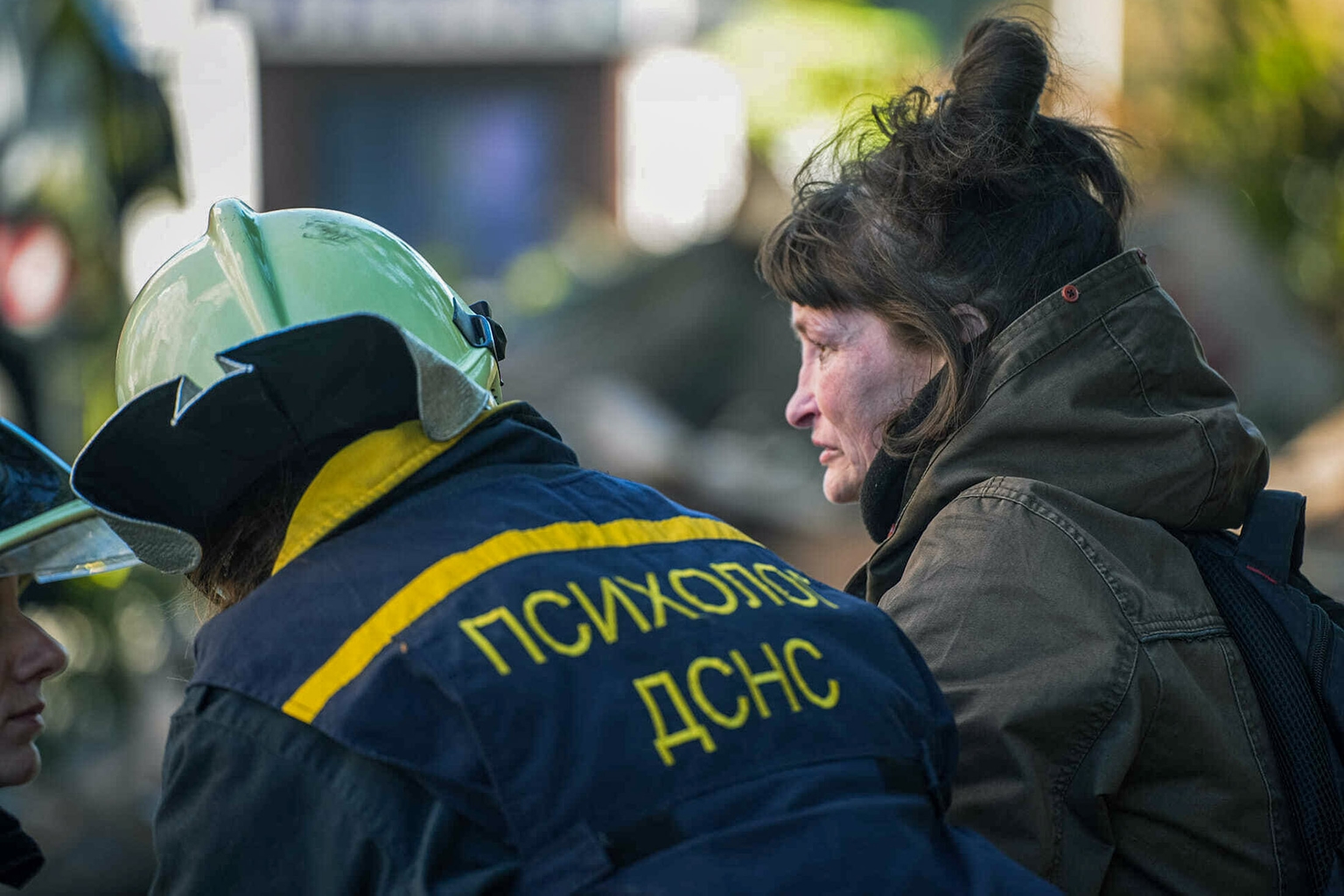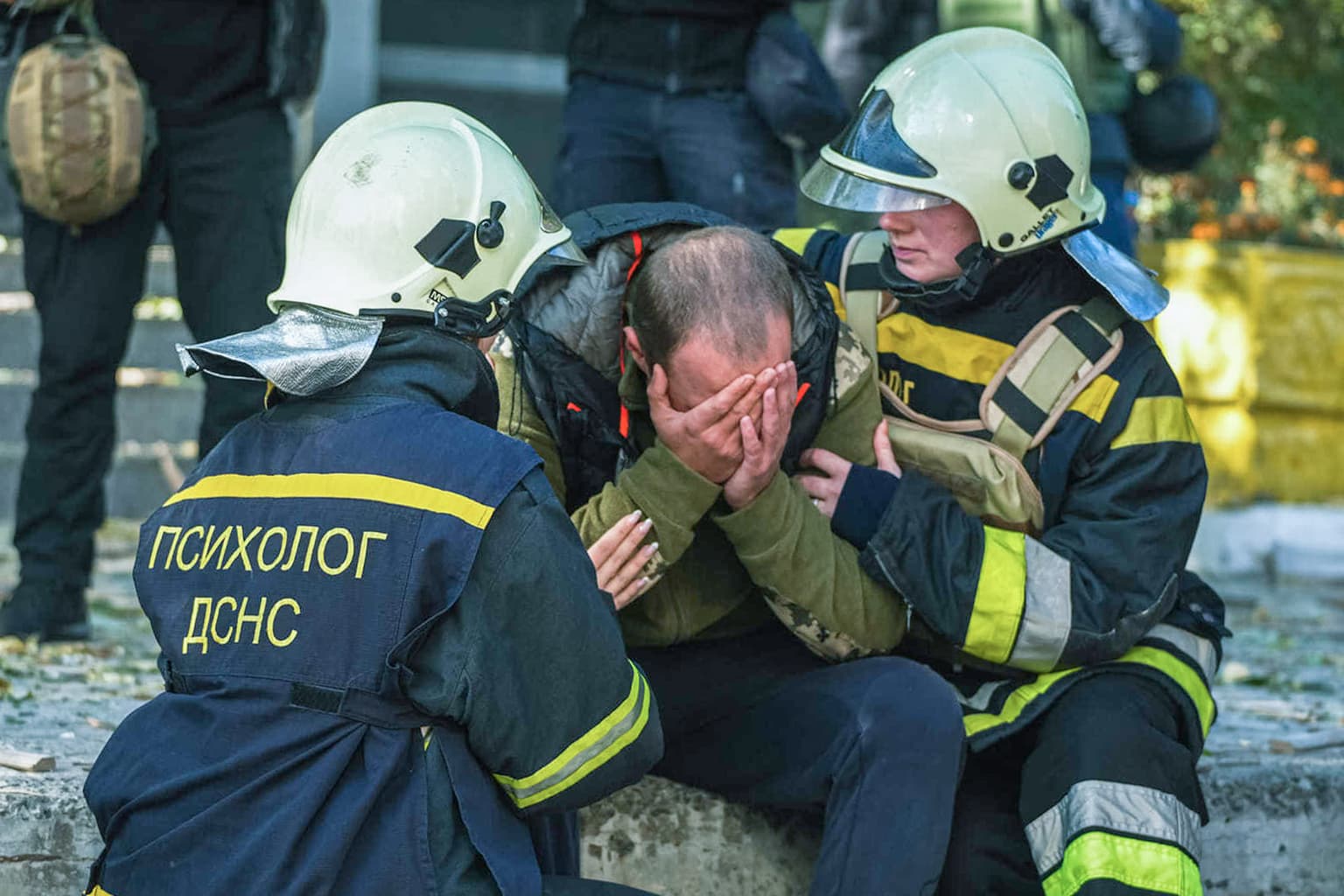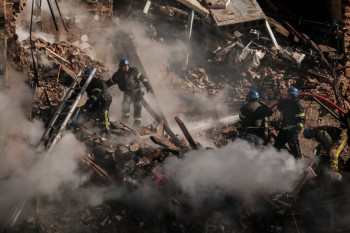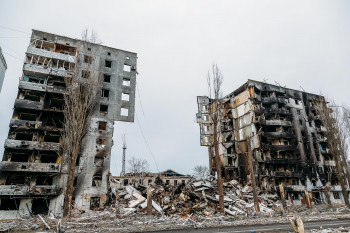When Russia's drone strike hit a residential building in central Kyiv on the morning of Oct. 17, emergency workers turned up at the scene within minutes.
As rescuers worked to put out the fire and clear out the rubble of the severely damaged high-rise apartment complex, medics provided first aid to the wounded. Police officers documented preliminary casualties.
At the scene, a team of psychologists also worked to provide no less urgent help to the victims: speaking to people who had just experienced an event that could leave potentially devastating effects on their mental health. Some of them may have lost a loved one or their home. For many, the stress of surviving a life-threatening attack can be overwhelming.
Though emergency psychiatric services are often overlooked, they may be just as critical as physical aid after a traumatic experience.
"We go where it is dangerous. It is scary, just like for everybody else. But we know why we are going there," says 27-year-old Nataliia Andriushchenko, who has been working as a psychologist at the State Emergency Service since 2017.
"We go there to help. We go there to save people," she adds.
The Russian drone strike on Oct. 17 killed five people, including a young couple expecting a child.
Russia’s near-relentless attacks on civilian infrastructure since the start of the full-scale invasion in February have put psychologists with the State Emergency Service on constant alert. Along with other emergency workers, they arrive at the scenes of missile and drone strikes, massive fires, and other disastrous consequences of Russia’s brutal attacks.
On alert
Before the full-scale war, psychologists of the Kyiv department of the State Emergency Service were called up to the sites of big accidents or catastrophes, often with many victims, such as a gas explosion that killed five people and destroyed an apartment complex in Kyiv's Pozniaky neighborhood in 2020.
Such calls used to be rare but Russia's war has changed everything.
"If earlier we had to work at the sites of events caused mainly by accidents, now these are targeted attacks on the city," says Liubov Kirnos, 32, who heads the unit in Kyiv.
Kirnos says that they are now called to every site of Russian drone or missile attack in Kyiv, which often results in the destruction of infrastructure and homes, and the killing of civilians.

Rescuers, a medic, and a psychologist (R) with the State Emergency Service of Ukraine work at the site of a Russian attack in one of the neighborhoods in Kyiv on March 17. (Pavlo Petrov)
Every oblast department of the State Emergency Service has staff psychologists, Kirnos says. There are currently six psychologists working in the capital.
The Kyiv team was called up to work soon after the first explosions were heard in the capital early in the morning of Feb. 24.
"I will never forget how I felt that day," Andriushchenko says. "When everyone was worried about how to flee Kyiv and evacuate their relatives, my number one task was getting to work," she recalls.
Devoted to helping others, they started working in "enhanced" mode from day one of the full-scale invasion, switching from the 8-to-5 schedule to 24-hour-shifts.
If nothing happens during a shift, they do their "regular" job, which includes paperwork, inspecting different units in Kyiv, and training exercises. But whenever their help is needed, psychologists arrive at the site of an attack or other accidents immediately, even if they are not on duty.
"It's not the kind of work that you can go home, switch to something else and not think about it," Andriushchenko says. "We must be ready any time."
According to 28-year-old psychologist Ivanna Davydenko, not only do they have longer shifts and more calls now, but they also have to be "very careful" at the sites, watching for possible repeated attacks.
"We must be vigilant to protect ourselves and the victims," she says.
Evacuees and occupation survivors
In early spring, numerous Ukrainians — including those who fled then-occupied towns in Kyiv Oblast — began arriving at the central railway station in Kyiv to take evacuation trains to safer regions in western Ukraine.
At the train station, the emergency service’s psychologists encountered victims of Russia's all-out war "en masse" for the first time.
Kirnos says that many people arriving at the station "could not remember the last time they ate or drank, as they were under such acute stress." Some of them looked withdrawn, while others tried to put up a good mood to cheer up their children. Many people were crying.

Liubov Kirnos, who heads the unit of psychologists with the State Emergency Service in Kyiv, poses for a photograph at the site of the Russian attack on one of the residential houses in the capital on June 26. (Maryna Kotsupei)
"The worst thing was not that these people were wounded, but that many of their relatives were killed or missing," says Davydenko.
Kirnos recalls a man who arrived at the train station with his little daughter. His wife and the gir mother was killed when Russian troops shelled a line of people waiting to get bread in the city of Chernihiv.
"There were many kids, so we created a special area for them with toys and pencils to distract them while they waited for trains," Kirnos says.
The psychologists worked with dozens of people at the train station, using various techniques to help them relieve stress. They say that during their time there they saw the unimaginable pain Russia's war had inflicted on civilians.
"We wanted to do everything to make their condition and stay (at the station) at least a little easier," says Andriushchenko.
In April they went to Borodianka, a town 40 kilometers northwest of Kyiv that was heavily bombarded and occupied by Russia during the early stages of the all-out war.
In Kyiv Oblast alone, Russian troops killed 1,365 civilians during the month-long occupation, Kyiv Oblast Police Chief Andriy Nebytov reported on Oct. 20. More graves are still being found in the region.

Psychologists with the State Emergency Service of Ukraine support crying people as they work in the liberated town of Borodianka in Kyiv Oblast on April 8. Borodianka was heavily bombarded and occupied by Russia during the early stages of the all-out war. (Maksym Chernov)
The psychologists spent nearly a week in Borodianka, providing support to people "in conditions of total grief and suffering." The work was also physically dangerous as Russian troops had scattered the area with mines in the wake of their retreat.
"There was a woman whose son, daughter-in-law, and little granddaughter were killed in a Russian airstrike on a residential building," Kirnos says. "She had to wait for a couple of days until their bodies were found under the rubble."
"She was in a deep stupor. She sat on a bench, hugged herself, and closed her eyes."
Kirnos says the doctors could not give her any medication, so the psychologists had to act quickly: By talking to her, Kirnos made the woman open her eyes and helped her to start breathing normally.
In about five minutes, the woman burst into tears. Once she started to reply, the doctors were finally able to give her the medication she needed.
Kirnos says that the lack of psychological first aid at such critical moments can result in depression and post-traumatic stress disorders.
"Our priority is to ensure that a person does not freeze in a certain emotional state," Andriushchenko says. "Because if that happens, it can affect their life for a very long time.”
Highest reward
Andriushchenko says that Russia's first-ever attack on Kyiv with kamikaze drones on Oct. 17 was by far the most dangerous for her and her colleagues. While she can not disclose details, Andriushchenko says she calls this day her “second birthday."
That morning, Russia attacked Ukraine with 43 drones, 37 of which were shot down. In Kyiv, the attack destroyed a residential building and damaged an office and apartment building next to it.
Psychologists spent nearly 12 hours at the site, helping not only the victims of the strike on the residential building but also those who were hiding in nearby bomb shelters, including children.

A psychologist with the State Emergency Service of Ukraine sits next to a woman at the site of a Russian drone strike that hit a residential building in central Kyiv, killing five people on Oct. 17. (Pavlo Petrov)
To stay sane after seeing all the horrors of Russia’s war, psychologists provide each other and their fellow rescuers with mental health assistance. Davydenko says art therapy and physical activity also help her to relieve stress.
Nevertheless, she says she does not regret choosing this job.
"Yes, it is a dangerous, very risky job that requires high emotional stability,” Davydenko says. “But it is for the sake of other people.”
She says she often gets "goosebumps" when she hears "thank you" from the people they have helped.
"This, perhaps, is the highest reward there can be," she says.














